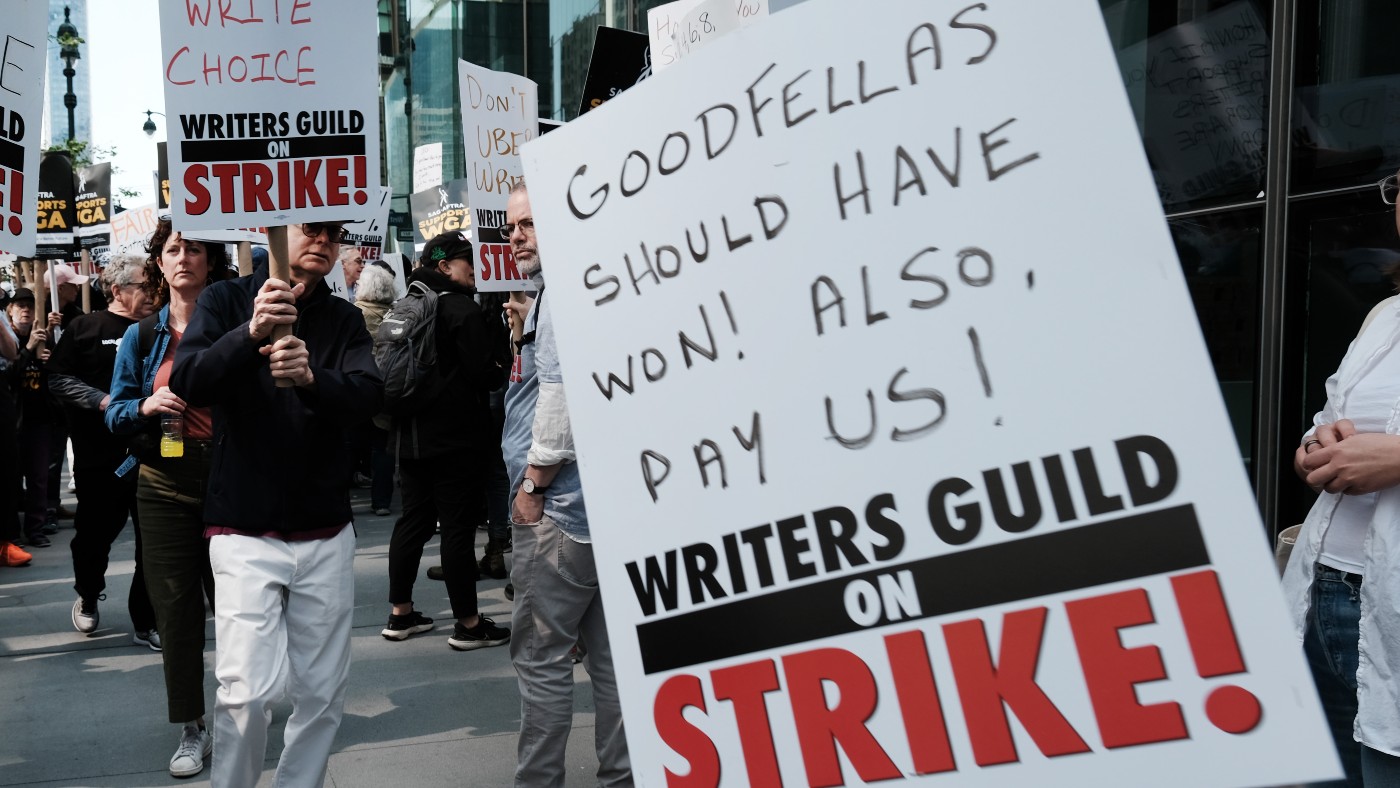Screenwriters on strike: Hollywood grinds to a halt
Writers claim they are treated as gig workers and set to be replaced by AI

A free daily email with the biggest news stories of the day – and the best features from TheWeek.com
You are now subscribed
Your newsletter sign-up was successful
One of the most famous telegrams in Hollywood history was sent in 1925, said Michael Schulman in The New Yorker.
It was from Herman J. Mankiewicz, the future co-writer of Citizen Kane, to his journalist friend Ben Hecht, urging him to move west and get into screenwriting, which Hecht later did, to great acclaim. “Millions are to be grabbed out here,” Mankiewicz told him, “and your only competition is idiots”. How times have changed.
‘Birth of reality TV’
Last week, the Writers Guild of America (WGA), the union representing most of Hollywood’s TV and movie scribes, went on strike in protest at poor pay and working conditions. It’s the WGA’s first strike in 15 years, said Chris Murphy and Savannah Walsh in Vanity Fair, and it could have interesting consequences.
The Week
Escape your echo chamber. Get the facts behind the news, plus analysis from multiple perspectives.

Sign up for The Week's Free Newsletters
From our morning news briefing to a weekly Good News Newsletter, get the best of The Week delivered directly to your inbox.
From our morning news briefing to a weekly Good News Newsletter, get the best of The Week delivered directly to your inbox.
The last strike, which went on for 100 days, delivered a boost to reality TV shows, which had the advantage of not needing a script. One show that emerged from that time and won huge ratings was Celebrity Apprentice, fronted by a certain Donald Trump.
‘Replaceable widgets’
The screenwriters have good reason to be unhappy, said Rick Cleveland in the Los Angeles Times. When I got into the trade 20 or so years ago, you could still make a decent living. You could work with directors on set and in editing, and go on to work as a co-producer. Royalties from the reruns of TV shows helped you through lean times. Today, though, writers are treated as gig workers, taken on for short contracts and let go before the production of their show even begins. And the streaming services that now dominate the industry pay out lower royalties. The business is making more money than ever, but it’s turning writers into “replaceable widgets”.
There’s another “huge issue” troubling writers, said Alissa Wilkinson on Vox: the rise of AI. They’re worried about studios using algorithmic tools to generate ideas for plots, or even scripts, and then hiring writers to polish them up. Writers could then be paid at a lower rate, since technically they’d be “adapting” an idea rather than creating original content. Given that many TV series and movies are, by their nature, “highly formulaic” – think police procedurals and romcoms – this fear is well grounded. Alas, the WGA is probably fighting a losing battle against AI, said Liz Wolfe in Reason. Some already fear the worst. As the writer C. Robert Cargill puts it: “You think Hollywood feels samey now? Wait until it’s just the same 100 people rewriting ChatGPT.”
A free daily email with the biggest news stories of the day – and the best features from TheWeek.com
-
 The ‘ravenous’ demand for Cornish minerals
The ‘ravenous’ demand for Cornish mineralsUnder the Radar Growing need for critical minerals to power tech has intensified ‘appetite’ for lithium, which could be a ‘huge boon’ for local economy
-
 Why are election experts taking Trump’s midterm threats seriously?
Why are election experts taking Trump’s midterm threats seriously?IN THE SPOTLIGHT As the president muses about polling place deployments and a centralized electoral system aimed at one-party control, lawmakers are taking this administration at its word
-
 ‘Restaurateurs have become millionaires’
‘Restaurateurs have become millionaires’Instant Opinion Opinion, comment and editorials of the day
-
 Kia EV4: a ‘terrifically comfy’ electric car
Kia EV4: a ‘terrifically comfy’ electric carThe Week Recommends The family-friendly vehicle has ‘plush seats’ and generous space
-
 Bonfire of the Murdochs: an ‘utterly gripping’ book
Bonfire of the Murdochs: an ‘utterly gripping’ bookThe Week Recommends Gabriel Sherman examines Rupert Murdoch’s ‘war of succession’ over his media empire
-
 Gwen John: Strange Beauties – a ‘superb’ retrospective
Gwen John: Strange Beauties – a ‘superb’ retrospectiveThe Week Recommends ‘Daunting’ show at the National Museum Cardiff plunges viewers into the Welsh artist’s ‘spiritual, austere existence’
-
 Bad Bunny’s Super Bowl: A win for unity
Bad Bunny’s Super Bowl: A win for unityFeature The global superstar's halftime show was a celebration for everyone to enjoy
-
 Book reviews: ‘Bonfire of the Murdochs’ and ‘The Typewriter and the Guillotine’
Book reviews: ‘Bonfire of the Murdochs’ and ‘The Typewriter and the Guillotine’Feature New insights into the Murdoch family’s turmoil and a renowned journalist’s time in pre-World War II Paris
-
 Microdramas are booming
Microdramas are boomingUnder the radar Scroll to watch a whole movie
-
 6 exquisite homes with vast acreage
6 exquisite homes with vast acreageFeature Featuring an off-the-grid contemporary home in New Mexico and lakefront farmhouse in Massachusetts
-
 Film reviews: ‘Wuthering Heights,’ ‘Good Luck, Have Fun, Don’t Die,’ and ‘Sirat’
Film reviews: ‘Wuthering Heights,’ ‘Good Luck, Have Fun, Don’t Die,’ and ‘Sirat’Feature An inconvenient love torments a would-be couple, a gonzo time traveler seeks to save humanity from AI, and a father’s desperate search goes deeply sideways